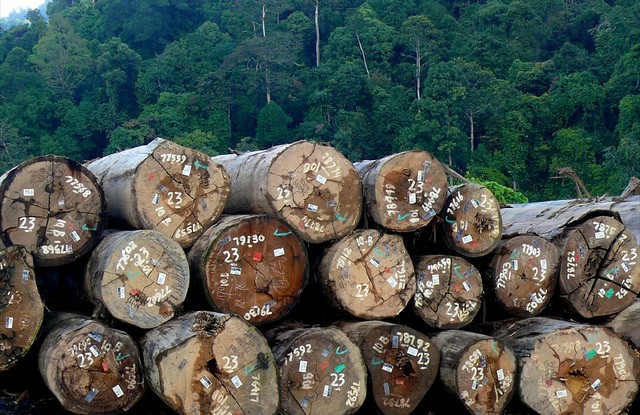
BOGOR, Indonesia: The move toward formalization of trade in natural resources in developing countries—from timber and rattan to chicle and cashews—must be undertaken with care, a new analysis of natural resource laws across the globe suggests.
Although most trade in natural resources is governed by national and international laws, a wide variety of informal rules, practices and customs persist.
Such informal sectors are often highly organized and successful, but they can also lead to unsustainable use of land and resources and entrenched poverty, which has many governments and institutions seeking to regulate them.
“There are such systems everywhere we work in tropical forest areas,” says Louis Putzel, a senior scientist at the Center for International Forestry Research (CIFOR) and a guest editor of a recent special issue on formalization in the journal Society & Natural Resources.
“In places where resource access and trade have been largely unregulated, but very busy, in codifying rules you need to understand existing practices and how they are set up—how people interact with each other, what kind of local structures govern who gets to go where and take what.”
Contexts as diverse as logging concessions in Indonesia, fisheries in Brazil, property systems in the Peruvian and Ecuadorian Amazon and artisanal gold mining in Zimbabwe are explored in the special issue, with the findings revealing what may work—and where the risks lie.
LICENCE TO FELL
Formalization efforts have been underway for a long time, in forestry and most other natural resources regimes.
Many informal systems are complex and varied, and they are often the bedrock social structure of the communities that employ them
Often, the goal has been to combat criminal or unethical trade, as in the cases of rhinoceros horn or conflict diamonds. At other times, the goal has been to augment the informal sector’s contribution to poverty alleviation, for example by providing legal title to customary lands.
But formalization tends to be trickier than simply making and enforcing a new law.
“Localized rules may predate State-recognized laws by years or even centuries,” says Putzel. “Many informal systems are complex and varied, and they are often the bedrock social structure of the communities that employ them.”
He offers as a case in point the multifaceted trade in tropical timber, which is often traditionally operated in legal gray areas or under customary systems of access and trade, and is important to the livelihoods of millions of people in tropical timber-producing countries.
An issue of concern is the interaction between informal systems and broader efforts to eliminate illegal timber sales, which increasingly include the international market.
“Some timber and, in certain cases, a lot of timber, from small-scale markets finds its way into the international market,” Putzel says.
“For example, mainland Chinese buyers are particularly active in accessing domestic markets and exporting the timber internationally.”
In the case of tropical timber, the most prominent legal mechanism for formalization is the European Union’s Forest Law Enforcement, Governance and Trade (FLEGT) Action Plan and the associated regulation to prevent illegal timber from entering the European market.
Under FLEGT, the EU makes Voluntary Partnership Agreements (VPAs) with timber-producing countries, under which the countries agree to make control mechanisms and legislative frameworks to verify the legality of timber exported to Europe, and in return gain access to the lucrative market.
LEGAL RISK
Yet formalization is not without its hazards.
For example, providing land titles where none had existed before may seem like a good idea, Putzel says, but not if wealthy outsiders obtain them at the expense of those who have lived on and worked the land for generations.
“Timing is very important,” he says. “If the policy is targeting poverty alleviation, you don’t want the most privileged coming in and taking advantage of those policies first. At worst, sophisticated criminal networks can find new illegal niches to exploit the new system and shut out legitimate local participants.”
Another risk with formalization that emerges is the so-called “race for the resource,” says Putzel, which can occur in the lag time between the announcement of a new policy and its actual enforcement.
“In those cases,” he says, “everybody rushes in to extract as much as they can, which can actually end up increasing the environmental damage the new rules seek to reduce.”
Other risks include the criminalization of longstanding practices upon which livelihoods depend; and “leakage” problems, where a new policy in one country simply displaces informal efforts to another country.
Scale is one key variable in formalization, but, the case studies show, it is not the only determinant of success.
This call for precise design runs throughout the articles in the special issue.
“The studies show that formalization of resource use will likely fare better if it accounts for and respect existing informal systems, rather than simply sweeping them aside,” Putzel says.
“Across the board, it’s very important who initiates formalization, for whom, for what reason, and in what order all this occurs.”
For more information about CIFOR’s work on formalization please contact Louis Putzel – l.putzel@cgiar.org
We want you to share Forests News content, which is licensed under Creative Commons Attribution-NonCommercial-ShareAlike 4.0 International (CC BY-NC-SA 4.0). This means you are free to redistribute our material for non-commercial purposes. All we ask is that you give Forests News appropriate credit and link to the original Forests News content, indicate if changes were made, and distribute your contributions under the same Creative Commons license. You must notify Forests News if you repost, reprint or reuse our materials by contacting forestsnews@cifor-icraf.org.

